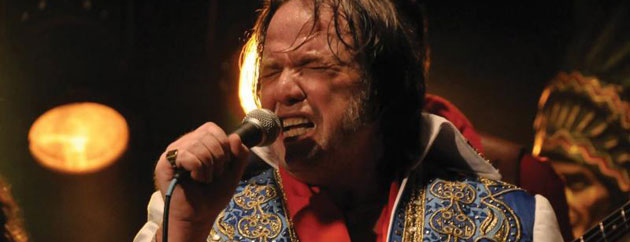
The Last Elvis (El Último Elvis)
27 July, 2012This first feature film by Armando Bo is a story about an Argentinean Elvis obsessive living the dream, while simultaneously living the life of an estranged parent trying to reconnect with his daughter.
This current incarnation of Elvis Presley (John McInerny) was born as Carlos Gutiérrez and works on a production line when he’s not donning the sparkly suits of the latter stage Vegas Elvis. In his own words:
“I invented rock and roll; I was never really gone.”
Alejandra, his ex (Griselda Siciliani) is less than enthusiastic when he occasionally comes to visit his daughter, Lisa Marie (Margarita Lopez), because she thinks that he’s taking his ‘silly songs’ a little bit too far. He even refers to his former wife as ‘Priscilla’ — consistent with the real Mrs Presley — and the fact that his daughter’s real name matches up with The King’s offspring can only fuel his delusions.
Carlos’ hobby/talent/calling is not portrayed as unique, however. He works for a Buenos Aires lookalike agency and when he goes in to collect his wages we see a version of Axl Rose talking to a copy of Slash in the stairwell; and a hairy John Lennon looks despondently at the notice board which only has calls for neatly-suited mop-topped Beatles.
At first we are unsure about just how seriously he takes the part. With the opening scene he could just be another Elvis impersonator: very keen and enthusiastic, a talented singer even; but he’s merely playing a role for a couple of hours a week. It’s not unusual for Elvis impersonators to refuse to break character while performing and we have to look out for extra clues that Carlos’ obsession is verging on the unhealthy side. In fact, maybe it is the public’s willingness to humour impersonators that allows Carols’ mental situation to get so bad.
For example, he seems to enjoy driving past ‘working girls’ on street corners in his Cadillac. These women never seem to fail in giving him the response he wants: “We love you, Elvis!” Another reassurance of his special gift.
In a later scene, after one of these ladies has accompanied him home, she asks him:
“Why are you like that guy on the TV?”
To which he can only reply:
“God gave me his voice. I just had to accept it.”
And we are now sure that this man’s hero worship is at a new level. It’s gone past admiration and gone into full possession by the demonic spirit of a long dead man who he has never met. This is not a new phenomenon though, as many psychics have claimed to have connections with Elvis’ spirit, most famously Uri Geller who even tried to help an Israeli family on their mission to bring world peace through Elvis’ music and a regular connection from beyond the grave.
One strange contrast is that you would expect Carlos to eschew all other activity in favour of singing, but he still puts in the time at the factory to earn money to give to his family. Even if his ex curses the day that she met him, somewhat ironically, he tries really hard not to remain the lazy self-indulgent slob which Elvis turned into in his latter days. Especially when unforeseen circumstances force him to take a more hands on approach to fatherhood.
Instantly, this film invites parallels with Pablo Larraín’s Tony Manero where a similarly misguided Chilean is obsessed with being John Travolta’s character from Saturday Night Fever and amidst the makeshift glitter balls and shiny white costumes there lurks a dangerously deranged individual, prepared to murder his way to disco superiority. Our Elvis is significantly less violent, and is even a kind and tender figure to his daughter, once he teaches her to see some value in Elvis’ music. And it’s in the performance of the King’s back catalogue which the film excels. John McInerny is a genuine impersonator and much of the film’s time is spent dwelling on the emotive power of the music on stage, playing acoustic or signing alone. Whether this device will convert more people to the cult of Presley remains to be seen, especially as at least part of the message which I got from the film was the futility of an Argentinean desperately seeking to live the American Dream.
The main problem being that for the Elvis impersonator, the American Dream is fulfilled through an excess of prescription medication and junk food, and completed by dying old and fat while sat on the toilet.
Follow Sounds and Colours: Facebook / Twitter / Instagram / Mixcloud / Soundcloud / Bandcamp
Subscribe to the Sounds and Colours Newsletter for regular updates, news and competitions bringing the best of Latin American culture direct to your Inbox.

